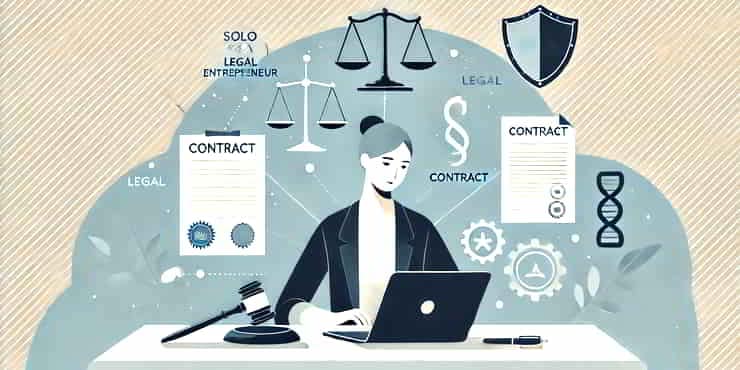Legal Essentials for Solopreneurs: A Comprehensive Introduction

Estimated reading time: 6 Min
There are a number of legal essentials for solopreneurs to consider. Here is an introductory guide.
Starting your own solo business can be both thrilling and daunting at the same time.
One of the critical aspects often overlooked by new solopreneurs is the legal side of things.
Understanding the legal considerations for running a solo business is vital to avoid potential pitfalls.
This guide aims to provide you with the legal knowledge you need to operate your business smoothly and confidently.
Understanding Business Structure
The first step in setting up your solo business is deciding on its legal structure.
This choice affects your taxes, liability, and even your ability to raise capital.
The three primary structures for solopreneurs are:
- Sole Proprietorship
The simplest form is where you and the business are legally the same. It’s easy to set up, but it offers no personal liability protection. - Limited Liability Company (LLC in USA or LTD in the UK)
Provides liability protection without the complexity of a corporation. A popular choice for many solopreneurs. - Corporation
Offers the most protection and potential tax benefits but comes with more regulations and paperwork.
Pros and Cons of Each Structure: Here’s a quick comparison to help you decide:
- Sole Proprietorship:
- Pros: It’s easy to set up, you can have complete control, and it requires simple tax filing.
- Cons: No liability protection; harder to raise capital.
- LLC:
- Pros: Limited liability protection, flexible management, pass-through taxation.
- Cons: More paperwork than a sole proprietorship; varying fees by state.
- Corporation:
- Pros: Strong liability protection; easier to raise funds; potential tax benefits.
- Cons: Complex setup, double taxation (unless an S-corp), more regulations.
2. Registering Your Business
Once you’ve chosen your business structure, the next step is to register your business name.
This process ensures that no one else can legally use your business name.
Check your local government’s website for specific requirements and fees.
Obtaining Licences and Permits
Depending on your industry and location, you may need various licences and permits to operate legally.
These can include:
- General Business Licence
Required by most cities or counties. - Industry-specific Licences
For sectors like healthcare, food service, or construction. - Home Occupation Permit
Check local requirements If you’re running your business from home,.
Always check with local authorities to ensure you’re compliant with all necessary regulations.
3. Contracts and Agreements
Contracts are the backbone of any business relationship.
They define the terms of service, payment, confidentiality, and more, providing a safety net for both parties.
Without them, you risk misunderstandings and potential legal issues.
Key Contracts for Solopreneurs:
- Service Agreements
Outlines the services you provide, payment terms, and deadlines. - Non-Disclosure Agreements (NDAs)
Protects sensitive information from being disclosed. - Partnership Agreements
If you’re working with others, this contract outlines roles, responsibilities, and profit-sharing.
Tips for Creating Strong Contracts
Ensure your contracts are clear and detailed.
Include all essential terms and conditions, and consider consulting a legal professional to draft or review them.
4. Intellectual Property (IP) Protection
- Trademarks
Protects your business name, logo, and brand identity. - Copyrights
Covers creative works like text, music, and software. - Patents
Protects inventions and new processes.
How to Protect Your IP
Start by conducting a search to ensure your IP is unique.
Then, file for protection through the appropriate government body.
For instance, the Intellectual Property Office handles trademarks and patents in the UK.
Handling IP Infringement
If someone uses your IP without permission, send a cease-and-desist letter first.
If that doesn’t work, you may need to take legal action. Consult an IP lawyer to explore your options.
5. Compliance and Regulations
Every business must adhere to certain regulations.
These vary by industry but often include:
- Industry-specific Regulations
Standards and laws that apply to your particular field. - Data Protection Laws (e.g., GDPR)
Ensuring the privacy and security of customer data. - Health and Safety Regulations
Ensuring a safe working environment for you and any employees.
Tips for Staying Compliant
Stay informed about the laws that affect your business.
Regularly review industry publications, join relevant professional associations, and consider consulting with a compliance expert to ensure you’re meeting all legal requirements.
6. Taxes and Financial Obligations
As a solopreneur, it’s essential to understand your tax obligations.
This includes registering for various taxes, such as VAT and Self-Assessment.
Depending on your country, you might need to register with HMRC in the UK, IRS in the US, or equivalent in other regions.
Record Keeping
Keeping accurate financial records is not just good practice but a legal requirement.
Proper records will help you manage your business efficiently and ensure you’re prepared for tax filings and audits. Use accounting software to simplify this task.
Hiring an Accountant
While you can handle many aspects of accounting yourself, there are times when professional help is beneficial.
An accountant can help you with tax planning, financial forecasting, and ensuring compliance with tax laws.
Consider hiring one, especially as your business grows.
7. Legal Resources for Solopreneurs
Online Legal Tools
There are several online tools and resources that can assist you with your legal needs.
Websites like Rocket Lawyer, LegalZoom, and others offer templates for contracts, legal advice, and more at a fraction of the cost of traditional legal services.
Professional Legal Advice
While online tools are great for basic needs, there will be times when you need professional legal advice.
This is especially true for complex issues or when facing legal disputes.
Establish a relationship with a local solicitor or legal professional who understands your business.
FAQs: Legal Essentials for Solopreneurs
What is the best business structure for a solopreneur?
The best structure depends on your specific needs and goals. Sole proprietorships are simple, LLCs offer liability protection, and corporations provide the most protection but come with more complexity.
Do I need a lawyer to start my solo business?
Not necessarily. While you can handle many aspects on your own, consulting a lawyer can help ensure everything is set up correctly and you’re protected legally.
How do I protect my business name?
Register your business name with the appropriate government body. Also, consider trademarking it to prevent others from using it.
What contracts should I have as a solopreneur?
Essential contracts include service agreements, NDAs, and partnership agreements if you’re working with others. These help protect your interests and clarify the terms of your business relationships.
How can I ensure my business complies with regulations?
Stay informed about relevant laws, join professional associations, and consider consulting with a compliance expert. Regularly review and update your practices to ensure ongoing compliance.
What is an S-Corp?
S corporations are US corporations that elect to pass corporate income, losses, deductions, and credits through to their shareholders for federal tax purposes and are unlikely to be useful for solopreneurs.
Summary
Understanding the legal essentials for running a solo business is essential to avoid pitfalls and ensure long-term success.
You’ll build a strong foundation for your solopreneur journey by choosing:
- The right business structure
- Registering your business properly
- Using clear contracts
- Protecting your intellectual property
- Staying compliant with regulations
If in doubt, don’t hesitate to seek professional legal advice to keep your business on the right track.
😉
Richard


![Are Wealthy Affiliate Hubs Revolutionising Website & Content Development In [year]? A futuristic and sleek digital workspace designed for website management and content creation - Wealthy Affiliate Hubs](https://ml0yvzumdtic.i.optimole.com/cb:k6B_.1fa14/w:740/h:370/q:mauto/https://solobusinessmind.com/wp-content/uploads/2024/12/A-futuristic-and-sleek-digital-workspace-designed-for-website-management-and-content-creation-Wealthy-Affiliate-Hubs740x370-O.jpg)



